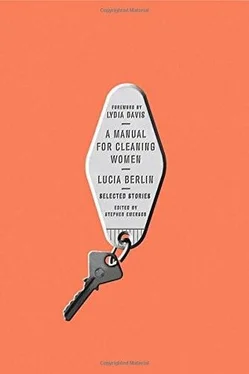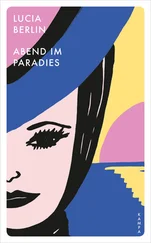A volunteer named Ada read the paper every morning. Turning and turning pages, avoiding crime and violence. Most days all she ended up with were bus crashes in Pakistan, Dennis the Menace, and the horoscope. Hurricanes in Galveston. (I also can’t understand how people have stayed in Galveston after all these years.) I came to enjoy the other patients. Most of them were even more senile than my father, but they were glad to see me, clawed at me with tiny fingers. They all recognized me, called me different names.
I kept going to visit him. Maybe out of guilt, as Florida said, but with hope too. I kept waiting for him to praise me, forgive me. Please know me, Daddy, say you love me. He never did, and I only go now to take shaving things or pajamas or candy. He can’t walk anymore. He gets violent, so they have him in a Posey day and night.
The last real time I was with him was on the picnic to Lake Merritt. Ten patients went. Ada, Florida, Sam, and I. Sam is the janitor. (Chimp, my father called him.) It took an hour to load them into the van, wheelchairs up a whining lift. It was very hot, the day after Memorial Day. Most of them had peed even before we got moving; windows steamed up. The old people laughed and were excited, but frightened too, flinching when buses passed us, sirens, motorcycles. My father looked nice in a seersucker suit, but then the front turned blue with Parkinson’s drool and dark blue all down one leg.
I had imagined that we would be under the trees, by the water, but Ada had us set up the wheelchairs in a semicircle facing the street, by the duck pond. I also imagined the winos would leave, but they just stayed on the benches in front of the old people. Some of the patients smelled cigarettes and asked for them. One of the winos gave John one, but Ada took it away and stomped it out. Exhaust fumes, and radios from the pimpmobiles and lowriders and motorcycles. The ground vibrated with joggers who bunched up when they got to us, running in place as they tried to get around. We were passing food, feeding the “feeders.” Potato salad and fried chicken. Pickled beets and Kool-Aid. Florida and I served plates to the four winos on the bench, and Ada got furious. There was way too much food, though. Neapolitan ice cream melted onto bibs. Lula and Mae just mashed the bars, played with them in their laps. My father was very neat when he ate, had always been meticulous. I washed each of his fingers. He has beautiful hands. I don’t know why they pluck at their clothes and blankets. It’s called “floccillation.”
After lunch a big woman in a park ranger uniform brought out a baby raccoon and passed it around. It was soft and smelled sweet and everyone liked it, loved it, really, holding him and stroking him, but Lula squeezed him so hard he clawed at her face. “Rabid!” my father said. “My legs!” John cried. The man gave John another cigarette. Ada didn’t notice, was putting the food trays into the van. The ranger gave the raccoon to the winos. The little animal obviously knew them, curled around their necks, calm. Ada said we had twenty minutes to give people rides around the duck pond and the birdcages, up the hill for a view of the lake.
My father had always loved birds. I parked him in front of the ratty horned owls, talking to him about different birds we had seen. The porcupine with green hair. The pileated woodpecker against the white aspen. A frigate bird off Antofagasta. Roadrunners mating, majestic. My father just sat there, his eyes glazed. The owls slept or were stuffed. I wheeled the chair away. All the others were festive, hollered and waved to us. John was really having a good time. Florida had made friends with a jogger who loaned her his tape recorder. Lula held it and sang while they fed the ducks.
It was hard to push the chair up the hill. Hot and loud with the cars and radios and interminable thud thud of the runners. It was so smoggy we could barely see the other shore. Memorial Day litter and debris. Paper cups floated in the foamy brown lake serene as swans. At the top of the hill I put on his brakes and lit a cigarette. He was laughing, an ugly laugh.
“It’s awful, isn’t it, Daddy?”
“It sure is, Lu.”
He loosened his brakes and the chair started down the brick path. I hesitated, just stood there watching it, but then I threw away my cigarette and caught his chair just as it was picking up speed.
The train slowed down outside of El Paso. I didn’t wake my baby, Ben, but carried him out to the vestibule so I could look out. And smell it, the desert. Caliche, sage, sulphur from the smelter, wood fires from Mexican shacks by the Rio Grande. The Holy Land. When I first went there, to live with Mamie and Grandpa during the war, that’s when I first heard about Jesus and Mary and the Bible and sin, so Jerusalem got all mixed up with El Paso’s jagged mountains and deserts. Rushes by the river and huge crucifixes everywhere. Figs and pomegranates. Dark-shawled women with infants and poor gaunt men with sufferer’s, savior’s eyes. And the stars at night were big and bright like in the song, so insistently dazzling it made sense that wise men couldn’t help but follow any one of them and find their way.
My uncle Tyler had cooked up a family reunion for Christmas. For one thing he was hoping my folks and I would make up. I dreaded seeing my parents … they were furious because my husband, Joe, had left me. They had almost died when I got married at seventeen, so my divorce was the last straw. But I couldn’t wait to see my cousin Bella Lynn and my uncle John, who was coming from L.A.
And there was Bella Lynn! In the train depot parking lot. Standing up and waving from a powder-blue Cadillac convertible, wearing a fringed suede cowgirl outfit. She was probably the most beautiful woman in West Texas, she must have won a million beauty contests. Long pale blond hair and yellow-brown eyes. Her smile, though, no, it was her laugh, a dusky, deep cascading laughter that caught the joy, implied and mocked the sorrow in every joy.
She tossed our bags and Ben’s little bed in the backseat. All of us Moynihans are strong, physically anyway. She kissed and hugged us both over and over. We got in and headed for the A & W across town. It was cold but the air was clean and dry, she kept the top down and the heater blasting, talked nonstop as she drove, one-handed since she waved at just about everybody we passed.
“First off I should tell you we’re short on yuletide joy out at our place. Uncle John gets here day after tomorrow, Christmas Eve, praise the Lord. Mary, your mama and my mama started drinking and fighting right off the bat. Mama went up on the garage roof and won’t come down. Your mother slit her wrists.”
“Oh, God.”
“Well you know, not bad or anything. She wrote a suicide note about how you had always ruined her life. Signed it Bloody Mary! She’s in Saint Joseph’s psych ward on a seventy-two-hour hold. At least your father isn’t coming, he’s furious about your D.I.V.O.R.C.E. My crazy grandma is there. Looney Tunes! And a passel of horrid relatives from Lubbock and Sweetwater. Daddy has them all put up at a motel and they drive over and eat all day and watch TV. They’re all born again so think you and me are just rotten to the core. Rex Kipp is here! He and Daddy are buying presents and stuff for poor people all day and hanging out in Daddy’s shop. So boy am I ever glad to see you…”
At the drive-in we ordered Papa burgers and fries and malts, like always. I told her Ben could have some of mine. He was just ten months old. But she ordered him a Papa burger and a banana split. Our whole family is extravagant. Well, no, my father isn’t like this at all. He is from New England, is thrifty and responsible. I turned out a Moynihan.
Читать дальше












